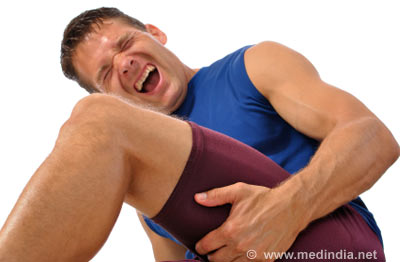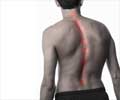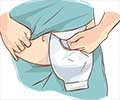- Why Is My Leg Cramping? What Can Help? - (http://www.webmd.com/pain-management/muscle-spasms-cramps-charley-horse)
- Muscle cramp - (http://www.mayoclinic.com/health/muscle-cramp/ds00311/dsection=causes)
- Muscle Cramps (Muscle Spasms) - (http://www.emedicinehealth.com/muscle_cramps/article_em.htm)
About
Muscle cramps occur commonly and result in temporary pain in the muscles. They are often due to overuse of muscles or dehydration.
Muscle cramps are involuntary and forceful spasms of a muscle where the muscle does not relax. They usually last for a few seconds to minutes and result in severe pain in the affected muscles, commonly the calf muscles.

Skeletal muscles contract and relax, which result in movement. This contraction and relaxation is brought about through the stimulation of nerves that supply the muscle. A sustained contraction results in cramps.
Conditions that overstimulate the nerves that supply to the muscles are associated cramps. Sometimes, cramps may appear by just keeping a limb in a single position for a long time. Cramps that occur in the legs at night are referred to as nocturnal leg cramps
Cramps often disappear with rest, passive stretching and a gentle massage. Sometimes, they may need hot or cold compresses. Repeated cramps may require consultation with a specialist.
Causes of muscle cramps include:
- Muscle overuse: Overexertion of muscles during exercise results in cramps. In addition, cramps may also be caused by insufficient stretching before the exercise or muscle trauma during the exercise.
- Mineral depletion: Dehydration or loss of electrolytes like sodium, calcium, magnesium and potassium following severe heat or athletic activity can result in muscle cramps. Therefore, adequate fluids with electrolytes as in sports drinks should be consumed during such sports to prevent cramps.
- Vitamin deficiency: Deficiency of B group of vitamins like B1, B5 and B6 affects nerve function and can result in cramps. These cramps may occur repeatedly, and are relieved with vitamin supplementation.
- Decrease in blood supply: Atherosclerosis, a condition that arises due to cholesterol deposition in the arteries, results in decreased blood supply to the legs. Thus, the supply of oxygen-rich blood is reduced, which is especially needed for walking and other activities; this results in pain and muscle cramps that worsen with movement. The cramps usually lessen or disappear with rest.
- Anemia: Anemia, a condition where the red blood cell count is low, results in reduced oxygen supply to the muscles. This amount of oxygen may not be enough to support muscle contraction and the accumulation of metabolites in the muscle may result in cramps.
- Compression of nerves: Compression of nerves coming from the spinal cord can cause muscle cramps in the area of distribution of the nerves. These cramps occur in conditions like lumbar stenosis and disc prolapse.
- Medications: A number of medications have been associated with muscle cramps. Thus, it is important to elicit history of medication intake in a person complaining of cramps. Furosemide, a diuretic, causes cramps by depleting the body of electrolytes. Drugs like terbutaline and salbutamol used in asthma, cause muscle tremors and thereby cramps. Neostigmine, a drug used for myasthenia gravis, directly stimulates the muscle and is associated with cramps in higher doses. Statins, the cholesterol lowering drugs, are associated with muscular side effects and cramps. Other drugs associated with muscle cramps include donepezil, raloxifene, tolcapone, nifedipine.
- Kidney disorders: Kidney disorders are associated with abnormalities in electrolyte levels like sodium and potassium. The cramps in these conditions may recur frequently and may be associated with urinary symptoms like decreased urination.
- Hormonal problems: Hormonal conditions like thyroid disorders, diabetes and hypoglycemia (low blood sugar levels) are associated with cramps. In these conditions as well, the cramps are likely to recur and are associated with other symptoms of the underlying illness.
Frequently Asked Questions (FAQs)
1. Which doctor should I visit in case I suffer from muscle cramps?
Your sports doctor or general physician may be able to help you in case you suffer from muscle cramps.
2. How are muscle cramps treated?
Muscle cramps are treated by gently stretching and massaging the cramped area. In addition, the person is advised rest and given adequate fluids and electrolytes to maintain the water and electrolyte balance in the body. Hot and cold compresses may also help.
3. How are muscle cramps prevented?
Muscle cramps can be prevented by taking adequate fluid with the recommended electrolytes during activities that are likely to cause electrolyte loss and dehydration. In addition, adequate stretching exercises are necessary before a person develops muscle cramps.









